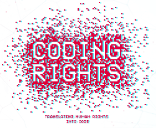Our work
The Human Rights Protocol Considerations Research Group in the IRTF is chartered to research whether standards and protocols can enable, strengthen or threaten human rights, as defined in the Universal Declaration of Human Rights (UDHR) and the International Covenant on Civil and Political Rights (ICCPR), specifically, but not limited to the right to freedom of expression and the right to freedom of assembly.
If you’re interested in this work, please have a look at the film produced by members of the research group, follow the work on the mailinglist and have a look at our latest active Internet Drafts.
If you have any questions or comments, feel free to contact the chairs of the Research Group directly.


Net Of Rights
Net of Rights is a short documentary film which explores the relation between Internet protocols and the promotion and protection of Human Rights.
Internet Engineers have defined the Internet as a network of networks, providing connectivity for all users, at all times, for any content. Internet connectivity increases the capacity for individuals to exercise their rights, the core of the Internet, its architectural design is therefore closely intertwined with the human rights framework. However, the assertion that technology and the design of standards and protocols is a ethically neutral task are still commonplace. The series of interviews recorded during the 92nd meeting of the Internet Engineering Task Force (IETF), held in Dallas, Texas, in March 2015, demonstrated that this belief in the neutrality of standards and protocols is starting to change. It is becoming more apparent that promoting an open, secure, unfiltered and reliable Internet is essential for the rights to privacy, expression and assembly. But how can these concepts be addressed on the protocol level?
Core Values
Without taking human rights into account while developing protocols, the human rights-enabling characteristics of the Internet are at risk. While the Internet was designed with freedom and openness of communication as core values, as the growth in scale and commercialization of the Internet have caused a shift in those values. The influence of such world-views started to compete with other values. The rights-enabling characteristics of the Internet will be endangered if they are not properly defined, described and protected. The reverse is also true: if we don’t protect human rights online, we risk loss of functionality and connectivity of the Internet itself.
Guiding Force
Conceived in partnership between
Article 19 and
Coding Rights, the movie aims to highlight the importance of addressing this issue within the technical community and human rights advocates, but also to feed into the work of the Human Rights Protocol Considerations research group (hrpc) in the Internet Research Task Force (IRTF). This group is currently mapping the relation between human rights and Internet protocols, in order to strengthen the Internet as a human rights enabling environment, in which freedom of expression through unimpeded connectivity remains a central principle and guiding force.Join the conversation at the
mailinglist and
#hrpc and
#netofrights.
Credits
Direction
Joana Varon
Production
Niels ten Oever
Research and script for interviews
Niels ten Oever and Joana Varon
Interviewer
Niels ten Oever
Editing
Marina Oriente
Script writing
Daniel Castro, Niels ten Oever, Joana Varon and Camila Agustini
Camera
Marina Oriente
Sound Design
Iuri Oriente
Animations
Fabio Cacossi
Narration
Carla Matero
Featuring
Adrian Farrel
Diego Lopez
Elliot Lear
Stéphane Bortzmeyer
Dan Harkins
Fred Baker
Nathaniel Borenstein
Suresh Krishnan
Ted Lemon
Daniel Kahn Gillmor
Stephen Farrell
Wendy Seltzer
Mark Nottingham
Spencer Dawkins
Aaron Falk
Kathleen Moriarty
Ben Campbell
Jari Arkko
Laura DeNardis
This film is a collaboration between Article19 and Coding Rights.
This film was made possible with the financial support from the Ford Foundation and John D. and Catherine T. MacArthur Foundation and travel support by Global Partners Digital.
This film is released under a Creative Commons Attribution 4.0 International license.

